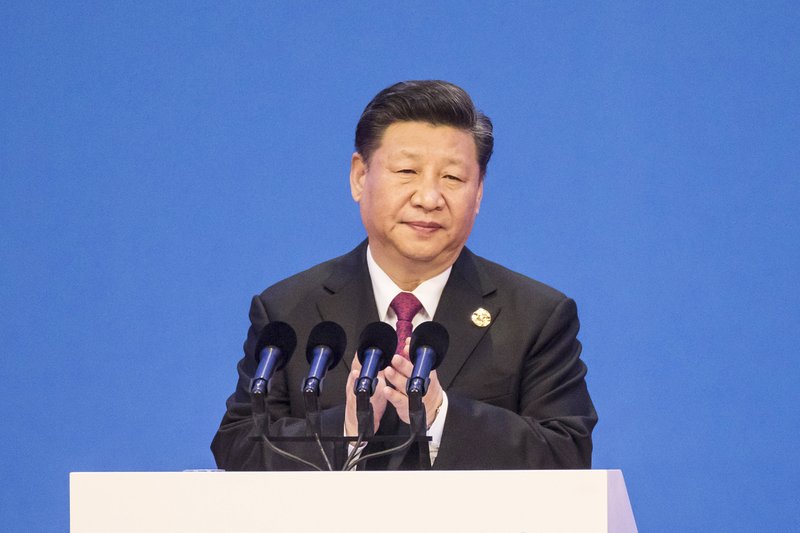BEIJING -- China is flatly denying President Donald Trump's accusation that it is interfering in November's midterm elections, implying that it is the United States that has a track record of meddling in other countries' business.
With an acrimonious trade dispute rumbling on and during an increasingly fractious security environment, the latest tit for tat could worsen the relationship between the world's two largest economies.
"I believe the international community knows very well who is most used to meddling in the internal affairs of others," Geng Shuang, a spokesman for the Chinese Foreign Ministry, told reporters Thursday. He did not name the United States directly but was responding to a question about Trump's assertion Wednesday at the United Nations that Beijing was attempting to influence the midterms.
"They do not want me or us to win because I am the first president to ever challenge China on trade," Trump said at a U.N. Security Council meeting, "and we are winning on trade -- we are winning on every level."
But the president and his top aides offered no evidence to support the contention that China was meddling.
Trump's ire appeared sparked by a four-page supplement that the China Daily, an English-language publication owned by the Chinese government, bought in the Des Moines Register on Sunday.
Asked about the newspaper ads, Geng said the idea that they amounted to election interference was "totally far-fetched and fictional."
"We advise the U.S. side to stop its unwarranted accusations and slander against China and refrain from wrong words and deeds that might hurt our bilateral relations and fundamental interests," he said.
The pages in the Des Moines Register were laid out newspaper-style, with a small note at the top labeling them as a China Daily supplement. The lead headline declared, "Duel undermines the benefits of trade" -- exactly the same message that has been plastered across China's state-owned newspapers these past few weeks as the government tries to hammer home the message that the trade war is bad for Americans.
Another headline read, "Dispute: Fruit of a president's folly," although there was lighter content, too -- about robotics and a fashion entrepreneur and President Xi Jinping's "fun days in Iowa."
China, among other countries, has a long history of using ads in newspapers, including in The Washington Post, to get across messages that it would have trouble persuading professional journalists to print.
Iowa was the perfect target for China for a number of reasons. For one, its status as the first state to vote during presidential primary season gives it outsize influence over the U.S. electoral process.
Second, it has a special status in the bilateral relationship. Long before he became China's president, Xi traveled to Muscatine, Iowa, to learn about agriculture.
Third, Iowa, a major grower of soybeans and producer of pork, stands to suffer greatly from an extended trade war.
Also Thursday, China labeled a recent mission by nuclear-capable U.S. B-52 bombers over the disputed South China Sea as "provocative," and said the U.S. was solely responsible for a recent downturn in relations between their militaries.
Defense Ministry spokesman Ren Guoqiang also reiterated at a monthly briefing China's objections to a recent U.S. arms sale to Taiwan and the imposition of U.S. sanctions over China's purchase of Russian defense equipment.
"As for the provocative action taken by the U.S. military aircraft, we are firmly against it and we will take all necessary means to safeguard our rights and interests," Ren said.
Two B-52s flew over the strategic waterway, largely claimed by China, earlier this week in what the Pentagon called a routine mission. Separately, two B-52s also flew this week over the East China Sea, where China has declared an air defense identification zone and claims uninhabited islands controlled by Japan.
China has sought to strengthen its claim to the South China Sea by building seven islands on reefs and equipping them with military facilities such as airstrips, radar domes and missile systems. Five other governments claim territory in the oil- and gas-rich area through which an estimated $5 trillion in global trade passes annually.
Asked at the Pentagon on Wednesday about the bomber flights, Defense Secretary James Mattis said he wasn't concerned they might raise tensions with Beijing.
"That just goes on. If it was 20 years ago and had they not militarized those features there it would have been just another bomber on its way to Diego Garcia or wherever," Mattis said, according to a Pentagon transcript, referring to a key U.S. base in the Indian Ocean.
"So there's nothing out of the ordinary about it," Mattis said.
Information for this article was contributed by Anna Fifield and Yang Liu of The Washington Post; and by Christopher Bodeen of The Associated Press.
A Section on 09/28/2018

